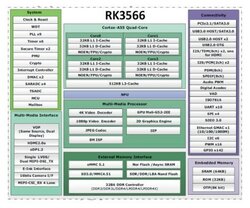Orange Pi introduces a new Rockchip based Computer Module
Orange Pi launched today their latest computer module based on a 64-bit Rockchip RK3566 quad-core processor. The device is compatible with a baseboard which offers a GbE, 40x GPIOs, multiple USB ports and a M.2 slot for SATA or PCIe connectivity.
The embedded module measures about 55 x 40mm and features the same Rockchip System-on-Chip seen on the Orange Pi 3B covered earlier this month.
The Downloads section doesn’t list this specific device yet, but the company mentions that the Orange Pi Computer Module 4 will support a variety of operating systems, for example, Android, Ubuntu, Debian, OpenHarmony, Orange Pi OS, etc.
CNX Software:
-
Orange Pi Compute Module 4 – A low-cost Rockchip RK3566-powered alternative to Raspberry Pi CM4
Orange Pi Compute Module 4 is a system-on-module mechanically and electrically compatible with the Raspberry Pi CM4, but powered by a Rockchip RK3566 quad-core Arm Cortex-A55 AI processor just like the Radxa CM3 introduced a few years ago, or more recently the Banana Pi BPI-CM2 (RK3568).
The new module, also called Orange Pi CM4 for shorts, comes with 1GB to 8GB RAM, 8GB to 128GB eMMC flash, and an optional 128/256MBit SPI flash, as well as a Gigabit Ethernet PHY and on-board WiFi 5 and Bluetooth 5.0. It comes with the two 100-pin high-density connectors found on the Raspberry Pi CM4, and a smaller 24-pin connector for extra I/Os.
Another source:
-
Orange Pi Launches Quad-Core Rockchip-Powered Alternative to the Raspberry Pi Compute Module 4
Embedded electronics specialist Orange Pi has launched a Raspberry Pi Compute Module 4-compatible system-on-module (SOM) built around the Rockchip RK3566 system-on-chip — and it's called, unsurprisingly, the Orange Pi Compute Module 4.
"Orange Pi Compute Module 4 is compact and powerful enough for deep embedded applications," the company claims of its latest launch, which is designed to be a pin-compatible drop-in replacement for Raspberry Pi's Compute Module 4 family — though the company has also announced an in-house carrier board, for those without existing investment in the CM4 ecosystem.

